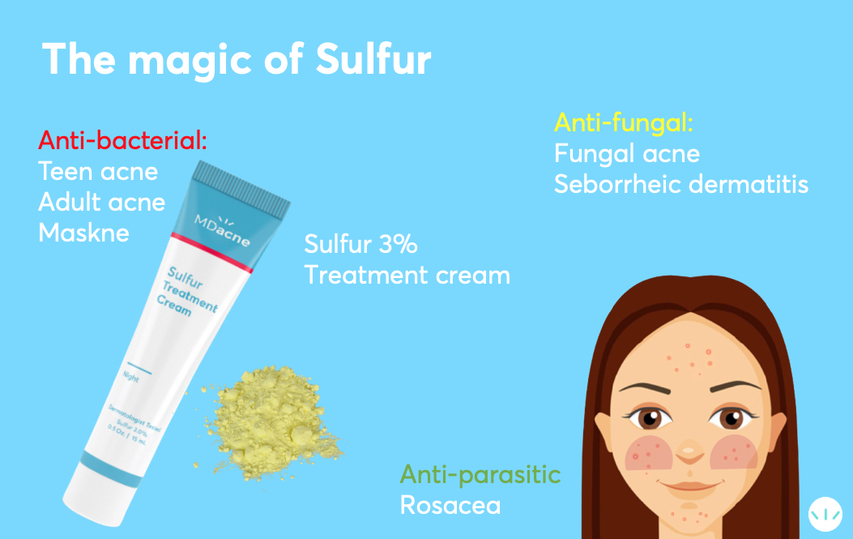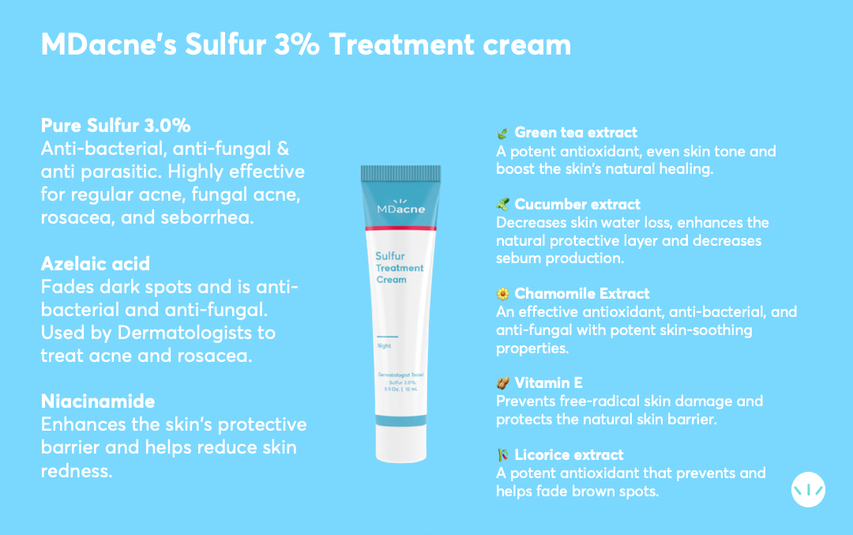Sulfur for acne, fungal acne and rosacea

The Benefits of Sulfur in Skincare
Historically called brimstone, sulfur has long been known for its skincare benefits. Dermatologists recommend sulfur for treating acne, rosacea, seborrheic dermatitis, fungal acne, and scalp conditions like psoriasis. Gentle yet powerful, sulfur is one of the safest and most versatile ingredients in dermatology.
What is Sulfur?
Sulfur is a naturally occurring element essential for life, found in amino acids, vitamins, skin, and hair. Though it has a distinctive odor reminiscent of rotten eggs, modern skincare formulations mask or neutralize it effectively. Sulfur works in various over-the-counter products to treat acne, dandruff, psoriasis, and other skin conditions and can also enhance hair texture and shine.
How Does Sulfur Work to Treat Acne and Rosacea?
- Keratolytic Action: Sulfur removes dead skin cells and unclogs pores, reducing blackheads and whiteheads.
- Sebum Reduction: Sulfur absorbs excess oil from the skin, keeping pores clear and preventing acne.
- Antibacterial Properties: Sulfur kills acne-causing bacteria (like Propionibacterium acnes), reducing inflammation and preventing new breakouts.
- Anti-Parasitic Effects: Sulfur targets Demodex folliculorum, a skin parasite linked to rosacea, alleviating rosacea symptoms.
- Antifungal Benefits: Sulfur fights Malassezia furfur, a fungus associated with fungal acne and seborrheic dermatitis.
How Sulfur Helps with Different Types of Acne
Acne Vulgaris: This common acne type occurs when pores become clogged with sebum and dead skin cells, allowing acne-causing bacteria to proliferate and cause inflammation. Sulfur's ability to clear out pores and reduce sebum makes it a great acne treatment.
Fungal Acne: Fungal acne, despite its name, is different from bacterial acne. It results from a yeast infection in the hair follicles and causes pimple-like bumps. Traditional acne treatments won’t work against this bacterial imposter. Fungal acne is often caused by factors like:
- Oral and topical antibiotics: These can disrupt the skin’s natural flora, giving yeast an opportunity to overgrow.
- Oral and topical steroids: These medications can weaken the immune response, making the skin more prone to fungal infections.
- Immunosuppression: Conditions that suppress the immune system can also increase the risk of fungal acne.
- Immunodeficiency: A weakened immune system reduces the body’s ability to keep yeast in check.
- Greasy cosmetics: Heavy, oil-based skincare products can create a moist environment that yeast thrives in.
- Excessively oily skin: Natural overproduction of oil can also encourage yeast growth.
- Stress: High stress levels can impair immune function, which may allow yeast to proliferate.
- Hot and humid environments: Warm, humid climates create an ideal environment for yeast overgrowth.
Sulfur’s antifungal and antibacterial properties make it a highly effective and safe treatment for fungal acne. Sulfur-based washes, masks, and spot treatments help by killing the fungi and reducing inflammation.
Is Sulfur Safe for All Skin Types?
Sulfur is gentler than ingredients like benzoyl peroxide and salicylic acid, making it suitable for sensitive skin. It’s often recommended for conditions like eczema, as it soothes and heals the skin without causing significant irritation.

Understanding the Difference Between Sulfur and Sulfa
It’s crucial to note that sulfur and sulfa aren’t the same. While sulfa refers to a group of antibiotics that can cause allergic reactions, sulfur is an essential element and does not typically trigger allergies, even in people with sulfa allergies.
Choosing the Best Sulfur Acne Treatment
There are various sulfur-based products, each suitable for different skin concerns and types. Here’s a guide to the main options:
-
Sulfur Treatment Creams: Sulfur treatment creams are ideal for overnight use and are highly effective for conditions like acne, fungal acne, rosacea, and seborrheic dermatitis. Modern formulations, such as MDacne’s sulfur cream, combine 3% sulfur with niacinamide, azelaic acid, and salicylic acid, offering enhanced acne-fighting benefits without the traditional sulfur odor. These creams are safe and non-irritating for sensitive skin, effective against fungal acne and seborrheic dermatitis, beneficial for rosacea due to their antibacterial and anti-parasitic properties, and particularly useful for treating mask-related acne (maskne) around sensitive areas.
-
Sulfur Soaps: Excellent for oily and sensitive skin, sulfur soaps help reduce sebum buildup and prevent acne without irritation, making them suitable for conditions like rosacea.
-
Sulfur Masks: These masks allow the active ingredients to penetrate deeper by staying on the skin longer. Used once or twice weekly, sulfur masks can dramatically improve clarity and texture by exfoliating dead skin, absorbing excess oil, and reducing breakouts. For best results, start with a gentle cleanser before applying the mask.
-
Sulfur Spot Treatments: Targeted sulfur spot treatments are excellent for speeding up the healing of inflamed pimples and rosacea spots, reducing appearance without excessive dryness.

How Long Does it Take to See Results?
Most people see improvements within 4-6 weeks of consistent sulfur use. Combining sulfur treatments with other acne-fighting products, such as a salicylic acid cleanser or benzoyl peroxide treatment, can help achieve optimal results.
Incorporating sulfur into your skincare routine offers a safe, effective solution for acne, rosacea, fungal infections, and more. Its versatility makes sulfur an invaluable addition to both acne-prone and sensitive skin types alike.
Shop:
3% Sulfur Treatment Cream with azelaic acid
References
- An update on the management of acne vulgaris
- The use of sodium sulfacetamide in dermatology
- Comprehensive Medical Management of Rosacea
To find the right acne treatments for your unique skin, take the free skin assessment by clicking here.



